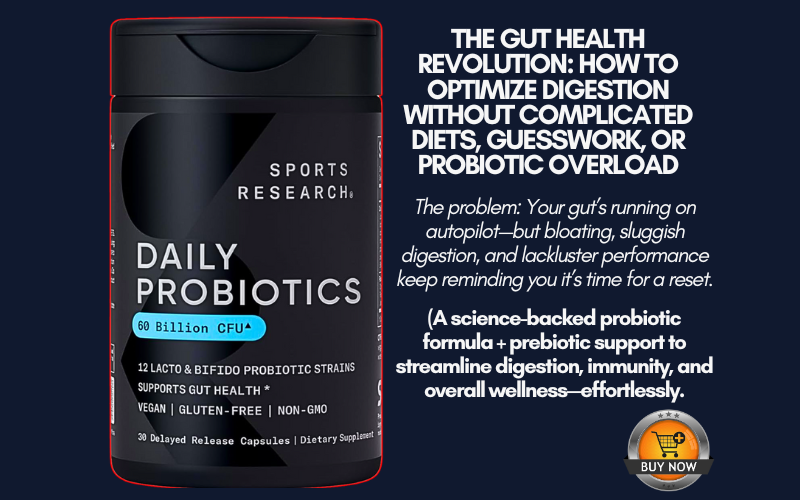Why Are Probiotics Important for Men? Let’s cut through the noise: probiotics aren’t just a “health trend”—they’re the unsung architects of your body’s performance. For men, a balanced gut does more than ease bloating; it regulates hormones, sharpens immunity, and fuels muscle recovery. Think of your gut as the control room for aesthetics, function, and real-world strength. Skip this, and you’re leaving gains—and grit—on the table.
The Gut: Your Body’s Silent Quarterback
“The gut isn’t a passive tube—it’s a hormone factory,” says Eugene Thong, CSCS. 70% of your immune system lives here, and it’s in constant dialogue with your endocrine system. For men, this means:
- Testosterone Support: Gut bacteria help regulate cortisol, freeing up resources for testosterone production.
- Nutrient Absorption: No gut health = wasted protein shakes.
- Inflammation Control: Less systemic fire = faster recovery.
Aging, Bacteria, and Bile: Why Strains Matter
As men age, gut flora shifts. “Certain strains resist bile acid,” notes Charles Damiano, B.S. Clinical Nutrition. Bile resistance ensures probiotics survive the digestive gauntlet to colonize your gut. Translation: pick strains engineered for your needs:
| Factor | The Aging Gut | The Bile Barrier | Why Specific Strains Matter |
|---|---|---|---|
| Gut Flora Shifts | As men age, the composition and diversity of their gut bacteria naturally change. Some beneficial populations may decline, while others increase. This can impact digestion, nutrient absorption, and immune function. | Probiotics, to be effective, must survive the acidic environment of the stomach and then the onslaught of bile salts in the small intestine before they can reach and colonize the gut. | Choosing strains known to thrive in the aging gut environment and those with demonstrated resilience to bile ensures they can actually reach their destination and exert their beneficial effects. |
| Probiotic Survival | A less robust gut environment in older age might make it harder for just any probiotic to take hold and colonize effectively. | Bile is a powerful antimicrobial substance produced by the liver to aid in fat digestion. It can damage or kill many probiotic bacteria. | Strains with inherent bile resistance are more likely to survive this digestive gauntlet and successfully colonize the gut, offering the intended benefits. |
| Targeted Needs | Aging men may experience specific health concerns like reduced nutrient absorption, increased inflammation, or changes in bowel regularity. | The level and composition of bile can also be influenced by diet and liver function, which may change with age. | Selecting strains with research-backed benefits for these age-related needs – such as those shown to aid in nutrient uptake or support a healthy inflammatory response – can be more effective than a generic probiotic. |
| Colonization Potential | For a probiotic to provide lasting benefits, it needs to be able to adhere to the intestinal lining and establish a presence (colonize). | Bile can interfere with the ability of some bacteria to adhere to the intestinal walls. | Certain strains have demonstrated better adhesion properties even in the presence of bile, increasing their likelihood of successful and sustained colonization. |

Who Needs Probiotics? (And Who Doesn’t)
For:
- Lifters chasing lean mass.
- Men over 40 battling “sluggish” metabolism.
- Anyone who wants to stop feeling like a bloated sack of laundry.
Not For:
- Those with compromised immune systems (consult a doc first).
- Men married to processed food—probiotics can’t outwork a junk diet.
The “Garden of Life” Strategy
Your gut is a ecosystem. To thrive:
- Feed the Good: Prebiotics (garlic, oats) fertilize beneficial bacteria.
- Fight the Bad: Probiotics crowd out pathogens—less real estate for troublemakers.
- Pick the Right Tool: Garden of Life Once Daily is a no-frills warrior. No added sugars, just 50 billion CFUs of bile-resistant strains.
The Testosterone-Gut Loop
Stress, poor sleep, and alcohol wreck your gut and hormones. Probiotics like Lactobacillus reuteri boost oxytocin—the “trust hormone” that indirectly supports testosterone. It’s not magic; it’s microbiology.
Your Move
Don’t overthink it. Start with a 2-strain probiotic (e.g., Lactobacillus + Bifidobacterium). Take it with breakfast. Track changes in energy, gym performance, and—let’s be real—bathroom regularity.

Your Gut’s Dirty Secrets: 6 Probiotic Questions Every Man Is Too Embarrassed to Ask
You’ve got the basics down—now let’s dig into the gritty, unspoken truths. The stuff that doesn’t make the brochure but absolutely impacts your gains, mood, and daily grind. These aren’t your grandma’s probiotic FAQs. Buckle up.
A: Maybe. But it’s not just about damage control. Specific strains like Bacillus coagulans target gas production at the source—like a tactical strike on rogue beans. Charles Damiano puts it bluntly: “A healthy gut doesn’t panic over a cheat meal.”
A: Surprisingly, yes. Your gut produces 90% of your serotonin. Thong notes: “A balanced microbiome is like having a zen coach in your intestines.” Less brain fog, more focus—critical for crushing PRs.
A: They’ll try. Alcohol nukes good bacteria, but resilient strains (Saccharomyces boulardii) can mitigate damage. Think of it as a “gut shield” during those inevitable late nights.
A: No. Unlike pre-workout, probiotics don’t hijack your system. Damiano explains: “You’re replenishing allies, not outsourcing your biology.” Stop taking them, and your gut just reverts to its baseline—junk food and all.
A: It’s a gut civil war. New bacteria clashing with old tenants causes bloat. Push through 2-4 weeks. “Discomfort means it’s working,” says Thong. “Like soreness after deadlifts—minus the bragging rights.”
A: Especially then. Testosterone therapy can strain the liver, and a healthy gut reduces inflammation. “Your hormones live downstream from your microbiome,” Damiano warns. Ignore this, and you’re half-assing your protocol.

YOUR NEXT STEPS:
